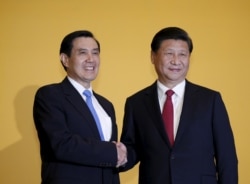Espionage between Taiwan and China has grown more sophisticated because of fewer people-to-people exchanges and more use of cyber tools, as relations between the two remain chill, analysts in Taipei say.
China claims sovereignty over Taiwan and insists that the two sides eventually unify, by force if needed. Taiwan President Tsai Ing-wen, bolstered by domestic opinion polls, rejects unification and relations have soured since she took office in 2016. Analysts say those conditions make each side want to know more.
Attention has riveted on spying over the past week as Taipei prosecutors evaluate whether former Deputy Defense Minister Chang Che-ping and others made contact with a representative of the Central Military Commission — China’s national defense organization — and if so, whether the contact constituted spying.
Chang and his wife traveled to China, expenses paid, after he met a Hong Kong businessperson who the commission sent to Taiwan in 2012, Taiwan-based United Daily News reports.
The former deputy minister’s case would follow the 2019 flap over Chinese national Wang Liqiang, who defected to Australia and said he had secretly helped China in relation to Taiwan affairs. Earlier this year, a Taiwan court gave jail sentences to two former Taiwanese legislative aides for setting up a network of Chinese spies.
On the other side, Chinese security agencies say they have “foiled” hundreds of espionage cases involving spies from Taiwan and arrested several of them, China’s party-run Global Times news website reported in October.
“This is not an isolated operation, as the mainland carries out similar actions every year, given that the rising number of spying operations by Taiwan authorities in the Chinese mainland over the years,” the Global Times says.
Spying takes place now, as always, through business transactions and academic exchanges, as well as through use of cyber tools, the experts say. Intelligence gathering through hacking or mining public data can avoid the risk of detection that actual agents on the ground face. Such online methods are more important now because COVID-19 and cooled Taiwan-China relations have reduced face-to-face cross-border exchanges, the analysts add.
“In that sense, I think maybe the espionage is decreasing but the intensity may increase too,” said Alex Chiang, associate professor of international politics at National Chengchi University in Taipei.
“The variety of espionage activity probably will be more diverse,” he said, adding that diminished personal contact reduces the odds of spies being caught, he added.
Chang’s case would stand out because of his rank, said Chen Yi-fan, assistant professor of diplomacy and international relations at Tamkang University in Taiwan.
“The former deputy defense minister’s case if true would be the highest-ranking military personnel who is involved in espionage cases,” he said.
Taiwan’s Mainland Affairs Council, the government body handling mainland China affairs, said in a November statement that in “recent years” China had “maliciously extended to overseas espionage” its effort to protect national security. The council had protested a month before over China’s “framing” of Taiwanese citizens to become spies.
The signing of 23 transit, trade and investment deals with China under Taiwan’s former president Ma Ying-jeou had increased contact, expanding the pool of people who could buy and sell secrets.
Today’s tense relations have reduced the number of Chinese entrepreneurs and university students in Taiwan while cutting back academic visits by Taiwanese to China, meaning fewer in-person meetings presenting an opportunity for espionage.
From 2010 to 2016, Taiwan unearthed least 33 cases involving citizens who sold sensitive defense-related information to China, Hawaii-based Asia researcher and author William Sharp told VOA at the time.
Cyber-spying poses a particular threat now, some experts say.
Chinese spies had used the internet for at least a decade before 2015, said Russell Hsiao, executive director of the Global Taiwan Institute policy incubator, on his blog. Hackers from a Chinese city “infiltrated” computers in Taiwan in one 2011 case and installed programs that “stole a large trove of data,” Hsiao said, citing local media reports. The attack infected 42 government websites and 216 computers.
Today’s hacker-spies are hard to differentiate from Chinese “nationalists” who use the internet on their own to spite Taiwan, said Sean Su, an independent political analyst in Taipei. China may be “ramping up”, he said.
Although more reports of spying are likely to emerge as Western countries focus harder on China’s activities directed at foreign countries, Su said, actual levels of the crime will probably hold constant.
“We will think that there’s more spying but in reality, it feels like it’s just the same old, same old all this time,” he said.





